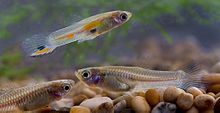Imitation effect
The imitation effect , also known as mate copying , is a term from behavioral biology and describes a preference for certain sexual partners, in which the individual does not seem to make an independent decision, but rather orientates himself on the choice of his sexual competitors and mimics them. Most studies have been carried out on fish of the genus Poecilia , but mimicking effects have also been documented on others such as Medaka ( Oryzias latipes ).
Intraspecific mechanisms
Female partner choice
Various studies show that female guppies ( Poecilia reticulata ) not only pay attention to which male has been selected by other females for mating, but that they also register which males did not mate with. In this way, the copying female reduces the cost of choosing a partner. Age dependency was also found: younger female guppies more often copy the partner preference of older females.

Male partner choice
An example of the mimicking of male partner preference by other males is provided by the broad-fin marijuana ( Poecilia latipinna ).
Interspecific imitation
In addition to intra-species imitation effects, there is at least one example of an inter-species imitation effect. Amazon parsnips ( Poecilia formosa ) are "sexual parasites", they occur exclusively as female animals; they need male broadfin corpse or other corpse as sperm donors for sexual reproduction . Female broad-finned parsons adopt the partner preference of female Amazon parsons for male broad-fin parsons.
Effects of imitation
An imitation effect can often be found in species where the risk of predation is high.
The mimicking effect can greatly increase sexual selection .
See also
Single receipts
- ^ Grant, James WA, Lawrence D. Green, Mate copying versus preference for actively courting males by female Japanese medaka (Oryzias latipes). Behavioral Ecology, Vol. 7, No. 2, 1996, pp. 165-167.
- ↑ Dugatkin, Lee Alan, Jean-Guy J. Godin: Female mate copying in the guppy Poecilia reticulata: age-dependent effects. Behavioral Ecology, Vol. 4, No. 4, 1993, pp. 289-292.
- ↑ a b Schlupp, Ingo, and Michael J. Ryan: Male sailfin mollies (Poecilia latipinna) copy the mate choice of other males. Behavioral Ecology, Vol. 8, No. 1, 1997, pp. 104-107.
- ↑ Briggs, Stephanie E., Jean-Guy J. Godin, Lee Alan Dugatkin: Mate-choice copying under predation risk in the Trinigadian guppy (Poecilia reticulata). Behavioral Ecology, Vol. 7, No. 2, 1996, pp. 151-157.
- ↑ Brooks, Robert: Copying and the repeatability of mate choice. Behavioral Ecology and Sociobiology, Vol. 39, No. 5, 1996, pp. 323-329.
